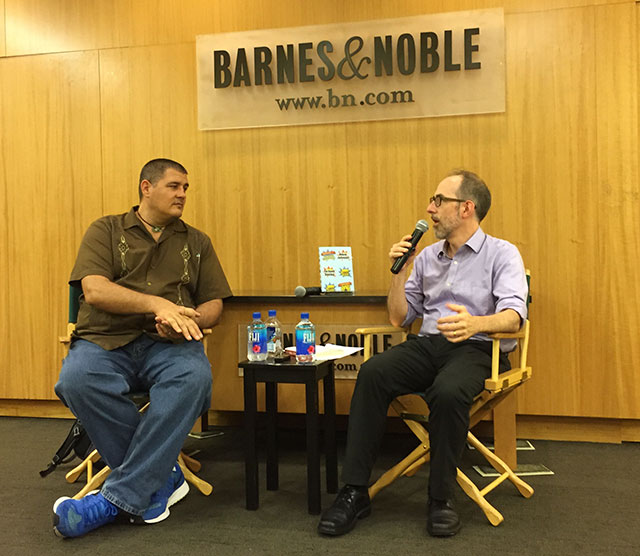
Adam Johnson discussed his new collection of stories, Fortune Smiles, with Bill Tipper last week at the Barnes & Noble 86th Street. The collection contains just six stories including subjects such as rare diseases and North Korea. His previous novel, The Orphan Master’s Son, also confronts issues of North Koreans.
Johnson’s stories intentionally pair darkness alongside humor. He explains that humor without darkness is simply light entertainment. “I don’t separate them in real life,” he says, adding that it took his children a long time to figure out his humor.
“People do not reveal the things that make them vulnerable,” he explains. The challenge in fiction is to maintain psychological verisimilitude while revealing those truths. Humor allows that to unfold because in almost all of Johnson’s characters, when they say something funny, it can be traced back to a pain. The humor reveals that pain naturally.
Tipper says the answer sounds a lot like an intellectual answer.
“I don’t feel like an intellectual,” Johnson explains. He elaborates by explaining that he doesn’t set out to explore themes or political ideas. Instead, he usually begins with a desire to explore a technical issue.
Working in the first person is fascinating to Johnson. As a reader, it is possible to perceive the distance between characters and the facts, and the delusion that exists between those two positions.
Johnson says that narrative is simply the way his mind deals with issues. During a period of his life, Johnson’s wife had breast cancer and an old friend of his committed suicide. He felt as though he couldn’t process both of those events unfolding simultaneously. While in college, his friend listened exclusively to Nirvana. Johnson says he never understood his friend’s obsession and after his death, Johnson started listening to the music hoping to hear what his friend had heard. Then he had a dream. In his dream, he saw a flying drone come to the window. He knew that the drone was his friend coming to visit him. He woke up thinking about him.
“I don’t recommend starting your stories with a dream you’ve had,” he says.
Johnson also says he is fascinated by the way life changes our perceptions of events and how events change our writing. Memories change, chronology changes, the stories end up evolving and pain is relived. He uses the example of the North Korean defectors he spoke with that inspired his story. In telling of their escape, they begin by speaking in the first person, but at the harrowing moments of the narrative, they shift to the third person. It is their way of protecting themselves.
The stories in Johnson’s collection are on the longer side of short stories. He describes himself as a maximus in writing. He says that he sees stories as Duracell batteries that charge up with emotion. Stories are not under the same obligations of novels–they can end in a moment and simply stop.
Johnson is immersed in North Korean knowledge. He explains that defectors usually come from the north, in places that are farthest from Pyongyang. These tend to be rural places with the least access to necessary resources, the first to starve in famine and the least likely people to have access to the rest of the world. The elite in Pyongyang though tend not to want to leave because they usually have benefits ordinary citizens don’t.
North Korea is mineral rich. There are many resources in the ground and buried in its mountains. However, there is little agricultural land. Also, because much of the world has embargoed the country, the North Korean elite are under enormous pressure to produce currency. They have plenty of schemes and many outright scams. They are excellent counterfeiters able to reproduce currencies like the U.S. bills. They also export meth and other drugs illegally. Whatever the scheme, the goal is foreign currency. Failing to produce currency means they are stripped of privileges, the most valuable being the right to travel abroad. Death of course, is always a possibility.
The defectors Johnson spoke with came from Pyongyang. They fled the country only because they faced death. It was the only reason they would leave because otherwise life is fairly comfortable for them, even if austere. Life in South Korea or in other places they might relocate to is upsetting and disturbing and often defectors do not understand how to assimilate. Johnson says one way of looking at it is prisoners in the American system who often understand very well how to function within in the prison system but the outside world is more challenging.
In South Korea, it is fairly easy to locate defectors, Johnson says, if you are looking. However, it isn’t easy to go around asking these people for their narratives. It might not be easy to hear.
“When something is half seen, it ignites the imagination,” he says.
He adds that we are all connected to North Korea. We fought them in a war. We watched M.A.S.H., a popular American sitcom about the war. And yet, Johnson says, he felt like he knew very little about the country. “I find the topic of North Korea fascinating.”
He set out asking himself “what was it like to be a human there?” He wanted to know basic things like how did people meet their wives. He started researching North Korea looking for answers.
He has also asked himself: “who am I to tell the story of these people?” He doesn’t speak Korean. He knew nothing. But he also knows he has an obligation to accuracy. “If you get something wrong, it matters.”